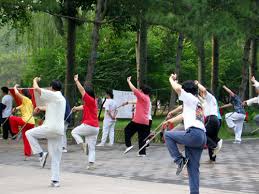Trailer Park T'ai Chi Brings Wisdom of Orient to Midwest
by Con Chapman

Home-away-from home-away-from-home
But Lamar's wife has been nagging him to do something about his high blood pressure, which has affected his performance in bed. After he finishes his dinner special and washes it down with a pitcher of Pabst Blue Ribbon Beer, he makes his way over to the senior center in this town of 9,000 in north central Missouri to try what his friends jokingly refer to as “Trailer Park T'ai Chi,” an updated version of the ancient Chinese “soft” martial art that emphasizes balance, slow movements and relaxed breathing over the tense, hard-edged gestures familiar to fans of kung fu movies.

His wife Velena has told Lamar she won't make fried chicken, lemon meringue pies or sweet potatoes covered with Kraft Jet-Puffed Miniature Marshmallows for him until he shapes up, so Lamar plunks down twenty dollars—”That hurts,” he exclaims with a wince—for a ticket good for five classes with Edward Elliot, an instructor trained in the Yang style of the ancient discipline. “It's just somethin' I gotta go through with if I ever want to see anything but rabbit food”—salad—”on the table again,” Lange says.

Elliot learned t'ai chi chuan as one of the first men to attend Vassar College in Poughkeepsie, New York, and his patrician bearing is softened by an aura that befits his role as purveyor of a genteel Asian art form to the American masses. “I've learned that I must present t'ai chi in a different way for an audience that is so far removed from its Oriental roots,” he notes as he calls the class to order and begins with the traditional Qishi or “commencement” posture.
“Why would a pretty blonde girl like you dye her roots black?”
“Let us move on,” Elliot says after the class has completed the first exercise. He adopts a stance that signals the traditional “Part the Wild Horse's Mane” form, but he calls it by a different name. “Will everyone assume the ‘Part the Hair of the Skanky Barmaid for a Bleachjob' position, please?” he says, and the students imitate him with varying degrees of success.
Nae Ann Oswego, a barmaid at the Dew Drop Inn, says she is not offended by Elliot's invocation of the archetypical figure that she herself embodies. “I don't really care,” she says as she chews a stick of Juicy Fruit gum. “I tried to get into the Buns of Steel class but it was full up.”

“Now,” Elliot continues, “please Embrace the ‘Possum, and Repulse the Repo Man five times.” Nae Ann performs this routine flawlessly. “No problemo—I've stopped Household Finance from takin' my Subaru plenty of times,” she says. “I need it to cool my pits when I get off work.”
Lamar is new to t'ai chi and his movements are unsteady since he hasn't yet developed the sense of balance that is characteristic of more proficient students. “Goddamn it,” he says as he topples over. “I probably shoulda just had a couple long necks instead of a whole pitcher of beer with dinner,” he mutters to himself.

“Repo man would rather die on his feet, than live on his knees.”
“If everyone will please pay attention now,” Elliot says in a voice that is both calm and authoritative. “Our next movement is a Right Grasp Chicken Fried Steak, followed by a Left Grasp Bag of Pork Rinds.” Lamar's mouth begins to water at the mention of two of his favorite foods, but he steadies himself and completes a passable imitation of his instructor.

Chicken fried steak: “What am I gonna do with all that parsley!”
The class winds down as Elliot demonstrates the Americanized version of “Needle at Sea Bottom,” a position that requires the students to balance on one foot while they lean over as if to pick up a minute object from the floor. “This position is called ‘Pick Up Last Quarter for Keno Machine,'” he says. “I want you to think of what you would buy with the big jackpot if you can successfully retrieve your lost coin from the floor and drop it in the slot.”
An expression of peaceful calm comes over Lamar's face. “I'm buyin' a bass boat!” he says, and Elliot realizes he has achieved a breakthrough with his new student.

“You have reached a state of taijitu,” or a balance between the yin and yang forces, he explains to Lange. “As Yang Chenfu says, ‘From ultimate softness comes ultimate hardness.'”
“If that's the case, I'm done,” Lange says.
“We are near the end of class,” Elliot replies agreeably.
“No, I mean I want my money back,” Lange says. “I was only doin' this so my old lady would put my feedbag back on. I'd rather go night fishing than have her latch onto me and snuggle.”
|
2
favs |
1233 views
4 comments |
971 words
All rights reserved. |
Author's Note
The author has not attached a note to this story.
Other stories by Con Chapman
Tags
This story has no tags.
I enjoy a ruthless satire.
Trailer Park T'ai Chi, pork rinds, and PBR? It's a documentary, right? I lourve it, luff it, loaf it. *
"Lourve" is how Celine Dion says it, one of her more endearing qualities.
Yeah, but whenever I hear it in my mind's ear, it sounds like Woody Allen and shrugging is somehow involved along with a soupson of kvetching.